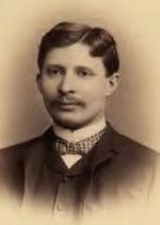
Victor Yarros
Encyclopedia
Victor Yarros was an American anarchist
and author. He was a prolific contributor to the individualist anarchist periodical in the United States
called Liberty
.
Yarros was early on associated with the anarcho-communists but soon converted to individualist anarchism
, and was very critical of everything collectivist
. Yarros did not see anarchism as a utopia
n system, but like the other individualists in his league, he envisioned a society in which coercion
was used only in defense: "The anarchists, as anarchists, work directly, not for a perfect social state, but for a perfect political system. A perfect social state is a state totally free from sin
or crime of folly; a perfect political system in which justice is observed, in which nothing is punished but crime and nobody coerced but invaders." This was to be accomplished by private forces, rather than by a tax-funded state.
Like other individualist anarchists, he opposed anarchist revolution through violent conflict. He did not believe an anarchist society could be achieved until individuals learned to value liberty
:
Yarros initially based his individualist anarchism on egoism
, penning an essay called Why I Am An Egoist, however, he later repudiated egoism, calling it "monstrously absurd and miserably nonsensical" (Liberty, VII, May 6 1891).
Anarchism
Anarchism is generally defined as the political philosophy which holds the state to be undesirable, unnecessary, and harmful, or alternatively as opposing authority in the conduct of human relations...
and author. He was a prolific contributor to the individualist anarchist periodical in the United States
United States
The United States of America is a federal constitutional republic comprising fifty states and a federal district...
called Liberty
Liberty (1881-1908)
Liberty was a nineteenth century anarchist periodical published in the United States by Benjamin Tucker, from August 1881 to April 1908. The periodical was instrumental in developing and formalizing the individualist anarchist philosophy through publishing essays and serving as a format for...
.
Yarros was early on associated with the anarcho-communists but soon converted to individualist anarchism
Individualist anarchism
Individualist anarchism refers to several traditions of thought within the anarchist movement that emphasize the individual and his or her will over external determinants such as groups, society, traditions, and ideological systems. Individualist anarchism is not a single philosophy but refers to a...
, and was very critical of everything collectivist
Collectivism
Collectivism is any philosophic, political, economic, mystical or social outlook that emphasizes the interdependence of every human in some collective group and the priority of group goals over individual goals. Collectivists usually focus on community, society, or nation...
. Yarros did not see anarchism as a utopia
Utopia
Utopia is an ideal community or society possessing a perfect socio-politico-legal system. The word was imported from Greek by Sir Thomas More for his 1516 book Utopia, describing a fictional island in the Atlantic Ocean. The term has been used to describe both intentional communities that attempt...
n system, but like the other individualists in his league, he envisioned a society in which coercion
Coercion
Coercion is the practice of forcing another party to behave in an involuntary manner by use of threats or intimidation or some other form of pressure or force. In law, coercion is codified as the duress crime. Such actions are used as leverage, to force the victim to act in the desired way...
was used only in defense: "The anarchists, as anarchists, work directly, not for a perfect social state, but for a perfect political system. A perfect social state is a state totally free from sin
Sin
In religion, sin is the violation or deviation of an eternal divine law or standard. The term sin may also refer to the state of having committed such a violation. Christians believe the moral code of conduct is decreed by God In religion, sin (also called peccancy) is the violation or deviation...
or crime of folly; a perfect political system in which justice is observed, in which nothing is punished but crime and nobody coerced but invaders." This was to be accomplished by private forces, rather than by a tax-funded state.
Like other individualist anarchists, he opposed anarchist revolution through violent conflict. He did not believe an anarchist society could be achieved until individuals learned to value liberty
Liberty
Liberty is a moral and political principle, or Right, that identifies the condition in which human beings are able to govern themselves, to behave according to their own free will, and take responsibility for their actions...
:
The abolition of the external State must be preceded by the decay of the notions which breathe life and vigour into that clumsy monster: in other words, it is only when the people learn to value liberty, and to understand the truths of the anarchistic philosophy, that the question of practically abolishing the State looms up and acquires significance.
Yarros initially based his individualist anarchism on egoism
Egoist anarchism
Egoist anarchism is a school of anarchist thought that originated in the philosophy of Max Stirner, a nineteenth century Hegelian philosopher whose "name appears with familiar regularity in historically orientated surveys of anarchist thought as one of the earliest and best-known exponents of...
, penning an essay called Why I Am An Egoist, however, he later repudiated egoism, calling it "monstrously absurd and miserably nonsensical" (Liberty, VII, May 6 1891).
External links
- The Woman Question by Victor Yarros (1888)
- How Victor Yarros Learned to Stop Worrying and Love the State by Roderick T. Long
- Victor Yarros, Individualist or Philosophical Anarchism (1897)

